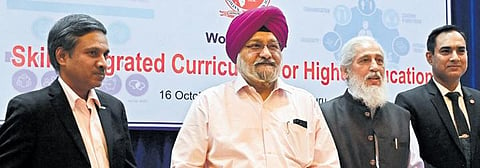

BENGALURU: Integration of skills into education will reduce the gap between academic knowledge and job requirements, improving graduates’ chances for job opportunities, said Nirmaljeet Singh Kalsi, chairperson of National Council for Vocational Education and Training, Government of India.
He was speaking at a workshop organised by the National Assessment and Accreditation Council (NAAC) here on Monday. The ‘Skill Integrated Curriculum’ session focused on promoting skill development in higher education and improving the quality of teaching. The chairman also spoke about the key aspects of planning, and implementing skill-oriented curriculum at the collegiate level.
Kalsi explained, “Despite only 6 per cent and 2 per cent of individuals pursuing their graduation and postgraduation respectively, there is a silver lining. The country has 49.2 per cent of the population with some digital skills which need to be effectively converted to fill the gap in the skill crisis faced globally today.”
The chairperson also mentioned roadblocks in conventional education and its impact on the country’s growth. The existing system had limited mobility between vocational education and higher education before the National Credit Framework (NCrF) was implemented. “If we remove this critical skill gap, India can improve its GDP growth rate from 6.5% to 8.8%,” he added. The workshop reflected on changing public perception that views skilling as the last resort, “meant for those who cannot perform in formal education”. Promoting a skill-based curriculum is the need of the hour.
Ganesan Kannabiran, Director, NAAC, said, “Graduates coming out of universities should have adequate knowledge with domain skills, life skills and social skills.”
Anil D Sahasrabudhe, Chairman, NAAC and National Educational Technology Forum, said the introduction of ‘One Nation, One Data’ and ‘One Nation, One ID Card’ will be a revolutionary move, making certification authentic without any scope for forgery or the need for attestation.